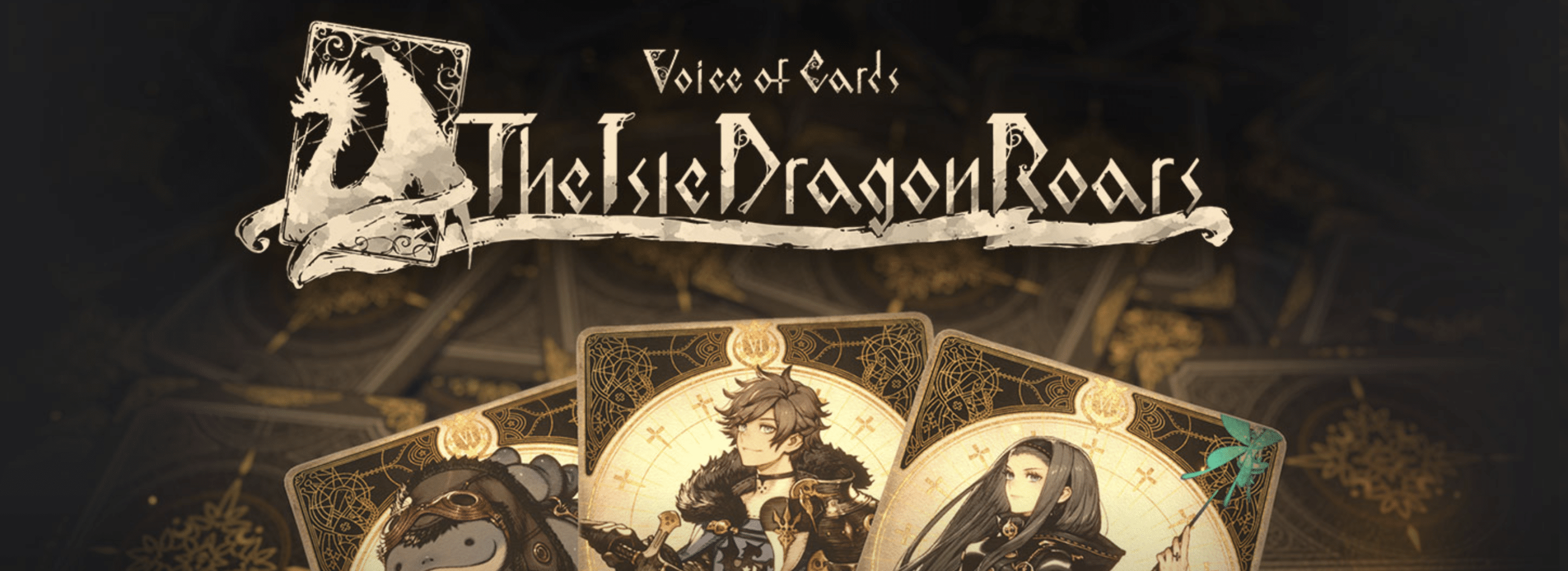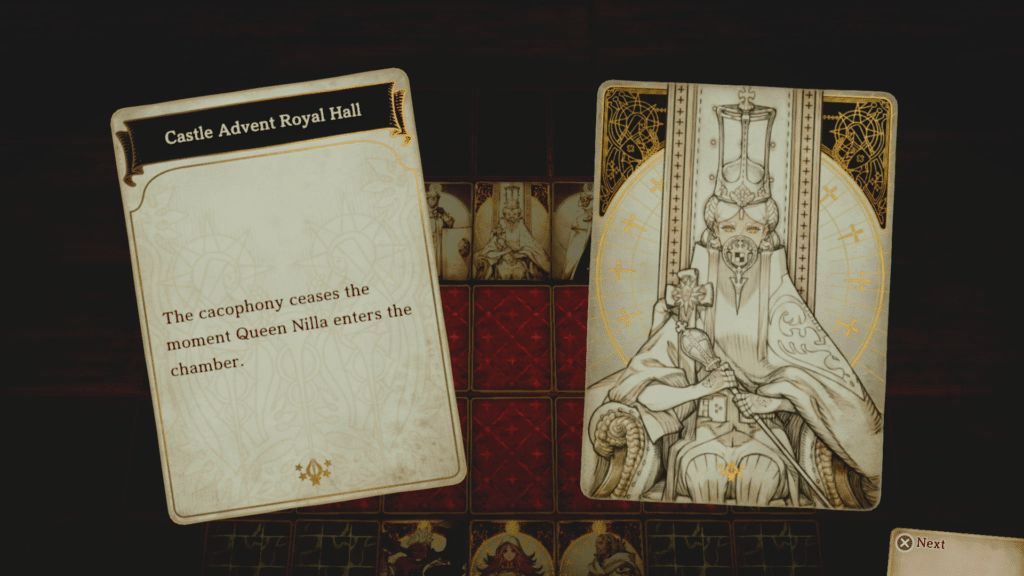

Similar to Dungeon Encounters, Square Enix’s latest release, Voice of Cards: The Isle Dragon Roars, challenges expectations of the genre. The delightfully designed card game takes some familiar and unfamiliar elements, combined with notable industry figures to make something both different and yet totally familiar. Unfortunately, risks like this can go either way, so is Voice of Cards: The Isle Dragon Roars is a must or is it a sad gimmick that falls short?
Unlike most games, Voice of Cards: The Isle Dragon Roars is told like you’re playing a game of Dungeons and Dragons. The story’s framework is so aware of this that the plot almost feels tongue-in-cheek. Essentially, a kingdom is terrorized by a fearsome dragon, forcing them to put a bounty on its head. Players control a rookie bounty hunter, who is more interested in monetary rewards than noble actions, with a monster and companion who wants to kill the dragon for personal reasons. There is also another group of hunters who act as something of a foil for the adventuring team.


What stands out isn’t the actual adventure, which is filled with optional quests, tropes and other things that play into the aforementioned concepts, it’s presentation. Everything is told as if a dungeon master in crafting the world around you. For example, there might be a random person who offers you a drink and you can choose to accept or decline. Instead of showing the interaction, it will be portrayed like ‘a old man who had seen better days approaches your party offering a drink, do you accept it?’ followed by having an option for each party member or the ability to decline. Let’s say you accept it, resulting in another interaction like ‘the would-be hero snatches the bottle, greedily consuming all the liquid. As he does this, the old man slowly begins to grin before saying “that is a great way to poison yourself,” before disappearing in the forest,” oh and then you lose like 10 HP for drinking poison.
Much to Voice of Cards: The Isle Dragon Roars’ credit, part of what makes the concept work is the willingness to add truly random events. You could step on the same space two or three times, only for the last time to have an optional event. Sometimes you’ll hear someone sing, see a monster in the distance, hear about treasure and these interactions guide your adventure. They don’t always play out the same, though they often have some kind of risk and reward attached. Sometimes you’ll get cash for your action, additional experience, or a fearsome obstacle. The answer hinges on the whims of your dungeon master.
Even if the core concept is kind of interesting, Voice of Cards: The Isle Dragon Roars struggles to step beyond the gimmick. As you likely already know, Voice of Cards: The Isle Dragon Roars is presented as a card game. However, it’s less a card game and more a stylistic approach to an otherwise basic RPG.
Despite appearances, every battle is the same. Your main team is set on the table, complete with their equipped weapon, armor, and accessory cards, plus whatever attacks cards you’ve selected. Instead of an MP system, there is a crystal system that is used with a wide variety of cards. It caps at like 10, it increases by one every turn, there are cards that give then and others that use multiples in exchange for bigger attacks. Beyond this, it plays out like a free-to-play game like Disgaea RPG.
Use your best attacks, gain resources and then complete the battle using as many as required. There are some luck-based elements, such as attacks that increase, hit, or change based off the roll of a die, as well as critical hits, though they play into the gimmick oversell the concept. Partly due to RPGs typically having an informal chance of ailments, whereas this one makes a production out of it.
Exploration is similar. Every space is a card, as are objectives, treasures, boundaries, shops and more. Moving a game piece across various cards as the adjacent ones flip in a cascade of new information is interesting at first, it just presentation can only go so far.
In some ways, it’s the opposite problem of Dungeon Encounters. There you had great mechanics attached to one of the simplest modern RPGs I’ve seen; this is a shallow RPG that tries to make up for it in concept. This isn’t to say there isn’t charm, I absolutely got into it once exploring a dungeon and even a simple RPG can be engaging, if only to collect resources for the future, it just caters to a very specific niche. One that is far more likely to love it if they have some history with the experiences it’s going for.
Voice of Cards: The Isle Dragon Roars: In a lot of ways, I applaud the concept behind Voice of Cards: The Isle Dragon Roars. It’s different, commits fully, and absolutely captures the experience it wants to create. The problem is, a gimmick like that can make it a hard sell. Games as a medium have distinctly different advantages, as well as those games catering to different elements, making it more of a well-executed concept. Naturally, fans of Dungeons and Dragons will likely find the experience comforting and enjoyable, whereas most other players will see a unique-looking game that plays like a rather generic RPG. – Grant
[Editor’s Note: Voice of Cards: The Isle Dragon Roars was reviewed on PlayStation 5 and a copy was provided to us for review purposes. PC version via Steam was tested.]
The Crew 2 is yet another live service by Ubisoft that was about to meet…
Ubisoft is currently under legal fire. A privacy firm has discovered that millions of users…
Gaming handhelds are one of the most convenient gadgets to engage with this beautiful medium.…
Remedy Entertainment's new game, FBC: Firebreak, has at last been officially confirmed to release on…
For those champing at the bit to dive into the visceral world of "Doom: The…
There was a recent leak that indicates the upcoming superhero team-based first-person shooter game, Marvel…